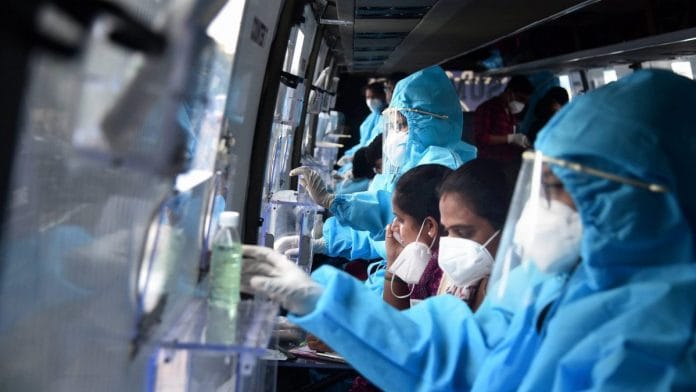New Delhi: A research paper, authored by representatives of the health ministry, has come under fire for claiming that the ongoing coronavirus epidemic will come to an end in India by September this year.
The paper — by Anil Kumar, deputy director general (public health) in the Directorate General of Health Services (DGHS), and Rupali Roy, deputy assistant director (leprosy), DGHS — claims that by mid-September “the number of infected will be equal to the number of removed patients”. Removed patients here refers to those who have recovered or died after being infected with Covid-19.
The paper was published in a journal called Epidemiology International, which does not appear in the ‘white list’ of approved journals compiled by the UGC-Consortium for Academic and Research Ethics (UGC-CARE). In fact, it has been flagged as a predatory journal.
The UGC had come up with this list in an attempt to address the problems of Indian researchers publishing their works in dubious, predatory journals.
Predatory journals are described as those that do not maintain high standards of ethics or integrity in peer-reviewing articles. Often, researchers can get their articles published in such journals by paying a fee and avoiding any peer review.
ThePrint reached the authors of the study for their comments through email and phone calls. While Kumar did not respond to either, Roy told ThePrint over phone that their team is now reviewing the paper.
Also read: Covid test positivity rates, rising deaths indicate that India isn’t seeing the full picture
Authors part of journal’s editorial board, other discrepancies
A number of scientists have flagged problems with the paper after an agency’s news story on the report was picked up by leading dailies.
Giridhar R. Babu, professor and head, lifecourse epidemiology, PHFI, took to Twitter to flag the fact that the paper was published in a dubious journal.
https://twitter.com/epigiri/status/1269616330044399616?s=20
“The methods are unclear and the prediction involves a questionable extrapolation to four months on,” Gautam Menon, a Professor of Physics and Biology at Ashoka University wrote on Twitter, criticising the media for featuring such news articles.
The methods are unclear and the prediction involves a questionable extrapolation to four months on. While there is public interest, I wish media would be more critical in deciding what to feature. https://t.co/drjLVOlOGc
— Gautam Menon (@MenonBioPhysics) June 7, 2020
‘Conflict of interest’
The authors, Kumar and Roy, are also on the editorial board of the very journal that has published their paper.
Menon also pointed out the “conflict of interest” in the journal publishing the paper.
“It is generally considered a conflict of interest if you are yourself responsible for publishing your own paper. Usually, in such cases, there is some statement from the researchers to say that a different procedure was followed for acceptance,” Menon told ThePrint.
He also explained that the researchers used a simplified mathematical model that does not take into account a lot of variables associated with Covid-19.
“The team also makes a completely irrational extrapolation several months later. There are many things that could happen between now and mid-September. Most people who work in the field of modelling in epidemiology would not do this.” Menon said.
He added that treating the whole of India as one homogenous entity is clearly wrong, when trends vary vastly across different regions.
Anant Bhan, another researcher, also highlighted the conflict of interest. “This paper is published in a predatory journal, and the authors are Executive Editor and Assistant Editor of the same journal,” he tweeted.
Once again, authors of this paper are senior officials within DGHS @MoHFW_INDIA
This paper is published in a predatory journal, and the authors are Executive Editor and Assistant Editor of the same journal #publicationethics #India https://t.co/YJ7yqYfU19
— Anant Bhan (@AnantBhan) June 8, 2020






